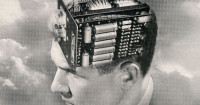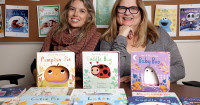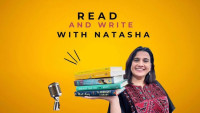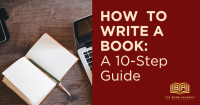
The Year That A.I. Came for Culture
newrepublic.com – Thursday December 21, 2023

The events of 2023 showed that A.I. doesn’t need to be that good in order to do damage.
This March, news broke that the latest artificial intelligence models could pass the LSAT, SAT, and AP exams. It sparked another round of A.I. panic. The machines, it seemed, were already at peak human ability. Around that time, I conducted my own, more modest test. I asked a couple of A.I. programs to “write a six-word story about baby shoes,” riffing on the famous (if apocryphal) Hemingway story. They failed but not in the way I expected. Bard gave me five words, and ChatGPT produced eight. I tried again, specifying “exactly six words,” and received eight and then four words. What did it mean that A.I. could best top-tier lawyers yet fail preschool math?
A year since the launch of ChatGPT, I wonder if the answer isn’t just what it seems: A.I. is simultaneously impressive and pretty dumb. Maybe not as dumb as the NFT apes or Zuckerberg’s Metaverse cubicle simulator, which Silicon Valley also promised would revolutionize all aspects of life. But at least half-dumb. One day A.I. passes the bar exam, and the next, lawyers are being fined for citing A.I.-invented laws. One second it’s “the end of writing,” the next it’s recommending recipes for “mosquito-repellant roast potatoes.” At best, A.I. is a mixed bag. (Since “artificial intelligence” is an intentionally vague term, I should specify I’m discussing “generative A.I.” programs like ChatGPT and MidJourney that create text, images, and audio. Credit where credit is due: Branding unthinking, error-prone algorithms as “artificial intelligence” was a brilliant marketing coup.)

Not taking “no” for an answer
niemanstoryboard.org – Thursday December 21, 2023

A freelancer persisted through multiple rejections and 17 edits to land an article in a favorite magazine
I’ve been both accepted and rejected by Nature Magazine.
For the same submission.
It all started when I met a bumblebee veterinarian at the UPOD Writer’s Conference this past January.
Some people keep a bucket list. I keep a publishing bucket list.
Nature had been on my publishing bucket list for pretty much forever. I had no real business being in Nature. I write a lot of personal, usually humorous essays for places like HuffPost and Newsweek; quirky, in-depth, forgotten-by-time pieces I call history-mysteries; culture/trend stories, including book reviews; and occasionally a health story, though not much in the sciences, and Nature is the creme de la creme of science publications.
But I had gotten smug of late, which I blame on my incongruous acceptance a month earlier of a lengthy, history-mystery piece in Smithsonian Magazine, another magazine in which I have no real business appearing. And I was an avid, almost fanatical reader, of Nature. I was particularly enamored of their short “Where I Work” pieces on the last page, which feature an interview with a scientist in a particularly unusual, sometimes bizarre, job, written in the first person. Truth to tell, I also loved it because it was the only part of the magazine I could consistently understand.)
So when we went around the room and did introductions at the writing conference, and Elizabeth Hilborn introduced herself as a veterinarian for honeybees, I immediately flashed to Nature Magazine. In my voracious readings of the “Where I Work’ column, I’d never read about a bee veterinarian or anything similar. It seemed a perfect fit.

How these San Diego kids books beat out bestselling authors like James Patterson, Anderson Cooper
sandiegouniontribune.com – Saturday December 16, 2023

Silver Dolphin Books, a San Diego book imprint you’ve probably never heard of, tucked into a Sorrento Valley office park you’ve likely never driven by, is behind three of the country’s most read books. They have a profound theme: the strength of human connection. They have sold millions of copies, everywhere from Target to Costco to indie booksellers and they have millions of views on TikTok.
Two of those titles just beat James Patterson, Barbara Kingsolver and Anderson Cooper on USA Today’s Best-selling Booklist.
Their target audience: babies. Sample titles: “You’re My Little Baby Boo,” “You’re My Little Pumpkin Pie,” and the book that started it all, “You’re My Little Cuddle Bug.”
If you are familiar with the “You’re My Little” book series, then you know exactly why tiny humans and their parents love them. If you are not, here is a quick primer: These are board books (with thicker pages) designed for kids under three about all sorts of babies (ghosts, butterflies, pumpkin pies) and their parents or caregivers. The pages have smooth cutout shapes perfect for fat little fingers to grab. The rhymes are easy. The illustrations are adorable — think the roundest eyes and rosiest cheeks and the smiliest smiles. Each book delivers a heartwarming message in about 100 words.

The ten-minute writing sprint is life-changing
jordannews.jo – Tuesday December 12, 2023

I now work on my fiction every day, even for only 10 minutes, and the words add up
I first heard about the ten-minute writing sprint concept during my podcast conversation with indie author Doug Weissman.
I was curious about this approach, so I tried it
Suffice to say, it has been life-changing.
I now work on my fiction every day, even for only 10 minutes, and the words add up, making me feel happy and accomplished.
Take that, procrastination!

Three Short Story Writers On Publishing and Crafting Their Debut Collections
electricliterature.com – Tuesday December 12, 2023

The short story is an entirely different pleasure than the novel. For writers, the form demands precision and intense scrutiny of craft choices. The short story is constrained by its brevity but remains limitless in the opportunities it presents to challenge notions of craft. The short story collection, then, is an art form in and of itself. In conversation, stories produce something new and thrilling. We are let in to linger and marvel at the writer’s world, to listen to its chorus of voices telling us something urgent.
This interview features three writers who published their debut short story collections this year: Ada Zhang, the author of The Sorrows of Others; Nishanth Injam, the author of The Best Possible Experience; and Alexandra Chang, the author of Tomb Sweeping. I called Zhang, Injam, and Chang to learn about their writing processes, relationships with the short story form, and experiences publishing their first collections.

10X Your Writing Quality With These 8 Useful Websites
medium.com – Tuesday December 12, 2023

1. Aleenarais.com/write
The best-ever solution to overcome your writer's block.
Every time you open the website, it loads a random image with a text box to write your thoughts.
This instantly motivates you to write.
Because now you don't have a blank page in front of you.
People usually face "Blank Page Syndrome." It simply means not being able to start.
So this website is a lifesaver for you, as it perfectly solves that problem for you.
Check out the site: https://aleenarais.com/write/

The Ingredients for a First-Rate (Crime) Novel
By G. Miki Hayden
Instructor at Writer's Digest University online and private writing coach
firstwriter.com – Wednesday December 6, 2023

I’ve been an instructor at Writer’s Online Workshops (from Writer’s Digest) since the start of this century, and a writer and writing instructor since well before that. I’ve taught hundreds of classes, which I can multiply by a modest average of seven students per class, so I’ve seen a lot of student writing, and much of it even credible. Most of the work could use some smoothing out, aka editing, however, and I’ve done a lot of that daily in dealing with the many class assignments students post, plus in editing chapters and whole novels privately. I can find certifiable flaws in almost every piece I look at. If I can’t find defects (rarely), my mouth drops open in astonishment.
In a mystery writing class I taught in August 2019 (my student reminds me), I discovered quite a bit in the assignments from writers that needed improvement—not an unusual situation. But what was different from what I see in most of the class material I work with was a story with elements that were outstanding. The author (Walter Sutton) and I began to work with his pieces of writing in class, and then I worked with him after and since, to this very day, in editing two of his novels (going into the third): Finders Keepers and Losers Weepers, both now in print and ebook at Amazon, and with Flash Finnegan Book 3 to come, working title, Knick Knack Patty Whack.
But because I acted as the editor of the two finished/in print books from a traditional publisher, I couldn’t write a review to post on Amazon—such is the rule of the site—even though I’ve admired Walt’s work from the first, and I still do.
So I decided to write an article about the books and explain what I respect in author Suttons’ crime fiction novels and use that as a sort of lesson for other crime fic and even general fiction writers.

3 writing tools to use and 3 to avoid: What I've learned writing 55,000 words of my fantasy novel
laptopmag.com – Sunday December 3, 2023

Writing is challenging, especially if you’re taking on a 110K-word fantasy novel like I am. If we were back in the pen and paper days, I would have given up years ago — my hand cramps just thinking about it. But we are in the modern era, and it’s time to let modern technology help us out (no, I’m not talking about AI, may the gods damn it to the nine hells).
Whether it’s a spellcheck, a planner, or the source of your manuscript, the tool you use needs to fit for the task at hand. I have used all three kinds of tools to elevate my writing, and I will continue to use it in order to hit my goal word count. But not every tool actually helped.
If you’re planning on putting the figurative pen to paper, here are 3 tools to use and 3 tools to avoid.

How to Write a Book: A 10-Step Guide
awesomelyluvvie.com – Thursday November 30, 2023

Writing a book is both an art and a science. It’s a journey that demands creativity, discipline, and strategic planning. I’ve written 4 New York Times bestselling books in 8 years, and I’ve used the same formula to make each happen. And now, I want to help more people get their stories out in ink, through books. I know the power of books, because becoming an author has changed my life! That’s why I’ve created The Book Academy, and why I’m teaching others how to get published!
Here’s a comprehensive 10-step guide to help you navigate from a budding idea to a published masterpiece.

Do I Need a Literary Agent?
keepthefaith.co.uk – Thursday November 30, 2023

Literary agent Vanessa Grossett explains the reasons for needing a literary agent, and the ins and outs of finding one
“Do I need a literary agent?” or “I am looking for a Christian-based literary agent” are the common question and statement I have been receiving lately, especially from new authors. Here is some info about why you might need one and how to find one.
What does a literary agent do?
A literary agent, sometimes called a literary manager, sells manuscripts on behalf on their authors. They manage their authors by making sure manuscripts get delivered on time to their editor; reading through contracts; some negotiate deals, and help promote their clients’ books.
Get the free newsletter | Submit a news item or article | Get Writers' News for your website





